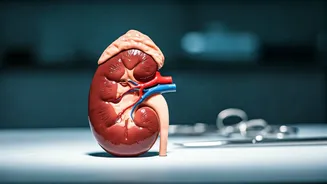Excessive Salt Intake
One significant habit that can impact your kidneys is the consumption of excess salt, particularly in the morning. Many breakfast items, such as processed
cereals, bacon, and even certain breads, contain high levels of sodium. Consuming too much sodium can elevate blood pressure, putting extra strain on the kidneys and potentially damaging them over time. Experts recommend monitoring sodium intake and opting for lower-sodium options whenever possible. This includes carefully checking food labels and being mindful of how much salt is added during cooking. Gradually reducing salt intake can greatly benefit kidney health.
Insufficient Water Intake
Staying adequately hydrated is crucial for maintaining kidney health. Insufficient water intake, especially in the morning after a night of sleep, can be detrimental. When the body is dehydrated, the kidneys struggle to filter waste effectively, potentially leading to the build-up of toxins. Drinking enough water in the morning helps flush out these toxins and ensures the kidneys function optimally throughout the day. Experts suggest drinking at least a glass of water first thing in the morning to kickstart the day and aid in kidney function. This habit, combined with consistent water intake throughout the day, can significantly support kidney health.
Over-the-Counter Painkillers
Another potentially harmful morning habit is the frequent use of over-the-counter painkillers. Medications like ibuprofen and naproxen, often taken for headaches or body aches, can be nephrotoxic if used excessively or over a long period. These drugs can reduce blood flow to the kidneys, impairing their ability to function correctly. Relying on painkillers regularly, especially first thing in the morning, can increase the risk of kidney damage. Consulting a healthcare professional before taking these medications regularly is advisable. They can provide guidance on safer alternatives or help monitor kidney health.
Skipping Breakfast Regularly
Skipping breakfast, especially when done consistently, can indirectly affect kidney health. Skipping breakfast can lead to overeating later in the day, potentially causing blood sugar and blood pressure fluctuations. These fluctuations can place additional stress on the kidneys. A balanced breakfast provides essential nutrients that support overall health and regulate blood sugar levels, helping to protect kidney function. Opting for a nutrient-rich breakfast can also contribute to better weight management, reducing the risk of conditions like diabetes and high blood pressure, which are major contributors to kidney disease.
Excessive Caffeine Consumption
Lastly, the habit of consuming excessive amounts of caffeine, like in coffee or energy drinks, can negatively impact kidney function. Caffeine acts as a diuretic, increasing urine production and potentially leading to dehydration, especially if not balanced with enough water intake. Dehydration, as mentioned earlier, is a significant risk factor for kidney problems. Furthermore, some studies suggest that high caffeine intake can elevate blood pressure, further straining the kidneys. Moderating caffeine consumption and ensuring adequate hydration can help to mitigate these risks. Being mindful of caffeine intake, especially in the morning, is crucial for preserving kidney health.






















